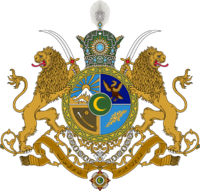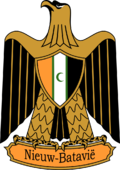Treaty between Çakaristan and New Batavia
The Treaty of friendship and cooperation between the Çakar Empire and the Islamic Republic of New Batavia was signed in Madinat Al-Mariyah on 5.V.1722 AN by Dervish Çelebi, Grand Vizier, for Çakaristan, and Rania Lucius, Grand Vizier for New Batavia.
At the signing ceremony, President Sulayman Salem was presented the Order of Çakar, First Class. Shahanshah Jaaguzan was presented the Badge of Honor of New Batavia, First Class in return.
Text
TREATY OF FRIENDSHIP AND COOPERATIONBETWEEN
THE ÇAKAR EMPIRE
AND
THE ISLAMIC REPUBLIC OF NEW BATAVIA
His Majesty, Jaaguzan, Shahanshah of Çakaristanand
His Excellency, Sulayman Salem, President of New Batavia
desire for a diplomatic relationship and good understanding between them, underpinning further friendship between their respective countries, have agreed to the following articles of agreement:Article I – Peace and friendship
There shall be a firm and perpetual state of peace and friendly relations between His Majesty, the Shahanshah of Çakaristan and His Excellency, the President of New Batavia, between Their Heirs or Successors, and between the Çakar Empire and the Islamic Republic of New Batavia, in this treaty the High Contracting Parties, and between their Citizens, without discrimination.Article II - Sovereignty and territorial integrity
Each High Contracting Party shall respect the independence, sovereignty and territorial integrity of the other party. The High Contracting Parties shall continue to develop and consolidate the relations of sincere friendship, good neighbourliness and comprehensive cooperation existing between them on the basis of the aforesaid principles as well as those of equality and mutual benefit.Article III - Airspace
The High Contracting Parties agree to sign and ratify the Convention on Civil Aviation of the Micras Treaty Organisation within two Norton years after the ratification of this treaty.Article IV – Diplomatic mission
The High Contracting Parties will maintain regular contacts with each other on major international problems affecting the interests of both of their countries and governments by means of meetings, and exchanges of views between their leading statesmen, visits by official delegations and special envoys of the governments, and through diplomatic channels.The High Contracting Parties will make an embassy available for each other. For the embassy, associated grounds, associated vehicles, leading statesmen, visits by official delegations, special envoys of the governments and ambassadors, diplomatic immunity applies.
Each High Contracting party recognizes and respects the procedures of acceptance by the ambassador, by handing over a letter of credence, which is addressed from one head of state to the other asking to give credence.
Article V - Recognition of bureaucracy
Each High Contracting Party gives to the other full faith and credit to all public acts, records, contracts and judicial proceedings in the field of civil law, including records and documents on marriage, property, titles, death and inheritance, in as much as any act, record, document, contract, proceeding is done according to the law.Article VI - Interpretation
Any difference of interpretation of any Article or Articles of this Treaty which may arise between the High Contracting Parties will be settled bilaterally by peaceful means in a spirit of mutual respect and understanding.Article VII - Ratification
This Treaty enters into force upon its signature and ratification by both High Contracting Parties in accordance with their respective domestic procedures.Article VIII - Repeal
Each High Contracting Party may repeal this treaty on the condition of a notice of one Norton year.Signed on 20.V.1722 AN at Madinat Al-Mariyah:
For the Çakar Empire:
Dervish Çelebi
Grand Vizier of Çakaristan
For the Islamic Republic of New Batavia:
Rania Lucius
Grand Vizier of New Batavia

